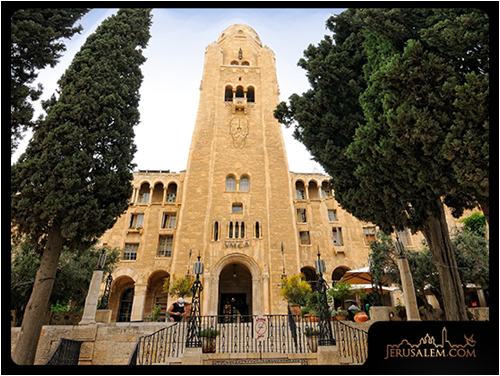Ever since the Palestinian-Israeli peace talks began nearly twenty years ago, it was clear that Jerusalem would be a thorny issue. Due to this, the common assumption has been that Jerusalem would come last in the negotiations, only after the issues of borders, settlements, security, and Palestinian refugees were decided. However there are those who feel that Jerusalem should be seen not as an obstacle to be left to the end of the negotiations, but rather it should be moved to the top of the agenda, essentially a “Jerusalem First” approach.
On August 11th, 2016, a workshop was held at the YMCA in West Jerusalem were Jerusalemites from both East and West came together to discuss what steps could be taken to move towards an independent East Jerusalem and how to foster better relations between East and West. The workshop was run by Jerusalem Councilwoman, Dr. Laura Wharton (Meretz) and Director of the Center for Democracy and Community Development, Walid Salem.
Five presentations were made as an opening to the workshop: two by Israelis, by Laura Wharton and Mario Schejtman about the Meretz political platform regarding Jerusalem, followed by presentations by Hanna Siniora and Walid Salem presenting the Palestinian point view. In between Dr. Gershon Baskin made a presentation about the establishment of independent governance in East Jerusalem. Altogether there were 30 participants in the workshop: 19 Israelis, 8 Palestinians and 3 internationals. Eight Palestinians had to cancel their participation at the last minute due to a stabbing in a nearby neighborhood.

The historic West Jerusalem International YMCA is an ideal venue to hold a discussion about the future of Jerusalem.
Jerusalem is one of the most loaded words in the Palestinian-Israeli lexicon. The very utterance of its name can stir up emotions that can overshadow a rational discussion. Yet many individuals, both Palestinians, and Israelis, at this workshop were able to come together to have a productive discussion that led to some very constructive ideas.
Two Capitals for Two States
Although it is abundantly clear that there can be no physical division of Jerusalem, the group concluded that both East and West Jerusalem have the right to be self-governing done so by an elected city council and mayor that would work in close coordination with their respective counterparts. It was the consensus of the group that no matter what the outcome, Jerusalem needs to be an open city that would allow Jerusalemites to cross from East to West, and West to East freely.
Another point of agreement on all fronts was the need to put an end to building new settlements or the expansion of existing settlements in East Jerusalem. Not only is there a need to stop demolishing Palestinian homes but, support is also necessary to protect the developments rights of East Jerusalem Palestinians which would include aiding in the preparation of zoning plans based on East Jerusalem communities’ best interests. What is needed is the creation of a master plan for the development of East Jerusalem, including the definition of its borders; The group felt that the best route to achieving these goals would be by acknowledging the right of East Jerusalemites to the revival of their pre-1967 Municipality (Amana), and by recognizing Nir Barkat as the Mayor of only West Jerusalem. A prerequisite of these actions would be aiding in the preparations to better prepare East Jerusalem for the upcoming municipal elections to be held by the Palestinian Authority.
Taxation without Representation
East Jerusalem grossly lacks municipal services, including the lack of paved roads, sidewalks, public parks and libraries. Palestinian East Jerusalemites as a whole constitute almost 40% of the city’s population, yet Palestinian residents receive only an average of ten percent of the municipal budget. For there to be a window of opportunity to foster better relations between East and West Jerusalem the level of services provided in East Jerusalem needs to be far more comparable to those in West Jerusalem.
Both Palestinian and Israeli participants at the workshop agreed that there needs to be an end of the discrimination by the municipality in its services to East Jerusalem. Many felt that this would be most effectively done if pursued by the Israeli side, from within the municipality. If these discriminatory acts were to continue it would be within East Jerusalemite rights to stop paying taxes from which they do not receive any return in the form of services.
Other points emphasized in the discussion included the need to reopen Palestinian national institutions in East Jerusalem like the Orient House, and the importance of stopping provocations in the Holy Places, particularly on the Temple Mount/Haram al-Sharif.
Movement from Within
Although international support is crucial to resolving the conflict, local actions can make some pretty big waves. Some ideas that were considered when talking about increasing local support were the need to aid and encourage the engagement of Palestinians in the democratic governance process, which could be done either through community councils or neighborhood initiatives. The idea of a joint think tank was discussed, which would be tasked with developing policies and programs to promote an weapons free East Jerusalem, the end of land confiscation, housing demolitions, and confiscation of identity cards. There was discussion of the possibility of a joint spiritual group that would work in unison to help resolve the conflict. But above all else, the continued encouragement for nonviolent responses to all the difficulties experienced in the city, this is a growing importance due to the rising hatred, racism, and violence in the city.

The comments engraved on the walls of the Jerusalem International YMCA are still valid today.
